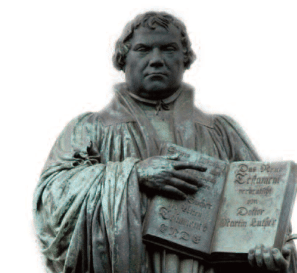
Can a theory change the historical reality of the facts? Can a theory be true if it contradicts the reality of the facts?
A New “Narrative” of Events
In the name of ecumenism, some are now changing the reality of historical facts regarding the life and works of the heretic Martin Luther, condemned by Leo X in the Bulls Exurge Domine (June 15, 1520) and Decet Romanum Pontificem (January 3, 1521, which excommunicated the apostate monk) and by the decrees of the Council of Trent (1545-1563).1
According to this new “ecumenical” narrative, the apostate monk was a great and well-intentioned reformer of the Church who opposed the abuses of the Renaissance Popes and the Roman Curia. And the narrative continues: the Church did not accept his inspired performance, and because of this and with the fault lying on both sides, Luther turned away and ushered in the great religious division of Europe.2
It seems this can be inferred, for example, from the following words of Pope Francis in an interview on the return flight from Armenia on June 26, 2016:
I think that the intentions of Martin Luther were not mistaken. He was a reformer. Perhaps some methods were not correct. But in that time…the Church was not exactly a model to imitate. There was corruption in the Church, there was worldliness, attachment to money, to power…and this he protested.3
In line with this judgment of Luther, Pope Francis will join the celebrations for the quincentenary of Luther’s revolt, traveling to Sweden in October.
A Doctrinal Revolt
The Pope’s opinion that Luther revolted because of the abuses in the Church is challenged both by historians and theologians, even non-Catholics. Among these, the Protestant Paolo Ricca comments on these words of Francis:
The true point that was the pivot of the Protestant Reform was not a moral but a theological problem.4
 Learn All About the Prophecies of Our Lady of Good Success About Our Times
Learn All About the Prophecies of Our Lady of Good Success About Our Times
Similarly, Msgr. Léon Crisitani, a respected expert on the pseudo-Reformation, pointed out for years that,
If abuses explain very well the meeting of a council [as of Trent], they are not enough to explain a revolution. They are but a negative cause, an occasion, if you want.5
Indeed, the “manifesto” in which Luther proclaimed his revolt against Rome in 1517, known as the “Ninety-five Theses” against indulgences, is of a theological nature.
In his famous book on Luther, Fr. Hartmann Grisar, S.J., comments:
If we examine the theses more closely…Many of them, from the theological point of view, go far beyond a mere opposition of the abuse of Indulgences.6

Fr. Erwin Iserloh says that Luther’s nominalist training led to separation “of the human and the ecclesiastical from the divine so far that he no longer attributed to the ecclesiastical penalty or its remission even an interpretive significance with regard to the penalties for sin imposed by God. In my view this seems to be a root of Luther’s proximate rejection of the hierarchical priesthood as a divine institution.”7
Faith Without Works
In the “Ninety-five Theses” and especially in later writings and sermons, Luther made clear he held fundamental propositions incompatible with Catholic doctrine. For example: only faith saves, without good works;8 human nature was totally corrupted by original sin, because of this man does not have free will;9 denial of Tradition and the Church’s Magisterium—the Bible is the sole authority;10 redemption was a solely external act: Jesus did not redeem us from original sin, but only covered our sins with the mantle of His merits.11
Faith, in Luther’s conception a mere confidence that we are already saved by the merits of Christ, opposes the principle of non-contradiction: even sinning, the person remains holy. According to his famous formula, man is “simultaneously a sinner and just (simul justus et peccator).”12
Acts, Gestures, Attitudes and Omissions Can Characterize a Heretic
In his pamphlet, The Babylonian Captivity of the Church, Luther makes it clear that the only sin for which the person can be lost is that of disbelief. As long as a person believes, he will be saved no matter how great a sinner he is:
See, how rich therefore is a Christian, the one who is baptized! Even if he wants to, he cannot lose his salvation, however much he sin, unless he will not believe. For no sin can condemn him save unbelief alone. All other sins – so long as the faith in God’s promise made in baptism returns or remains –all other sins, I say, are immediately blotted out through that same faith, or rather through the truth of God, because He cannot deny Himself.13
And in Luther’s famous advice to his disciple Melanchthon in a letter of 1521:
“Be a sinner, and let your sins be strong, but let your trust in Christ be stronger.”14
What Was Luther’s “Reformation”?
If the Church had accepted Luther’s “reform,” it would have resulted in the destruction of the Catholic Church as Our Lord Jesus Christ founded it with the Apostles and was sanctified by the martyrs and confessors.
In short, the “reform” of the Church, as Luther held, was the abolition of:
- the Papacy;
- the ministerial priesthood;
- the Sacraments as understood in Catholic theology;
- ecclesiastical celibacy;
- religious orders;
- the Church’s hierarchical structure, the clear distinction between the laity, clergy and religious;
- the Holy Sacrifice of the Mass (reduced to a simple memorial of the Lord’s Supper);
- traditional piety: devotion to Mary, the saints and the souls in Purgatory; novenas and processions; praying the rosary; adoration of the Blessed Sacrament (Luther did not accept the Real Presence outside of the Holy Supper); pilgrimages, indulgences, etc.;
- the Sacrament of Matrimony, marital indissolubility (with acceptance in certain cases of bigamy and adultery).
How Can a Pope Celebrate Such a “Reform”?
From what we have seen above it is clear that a Pope, the head of the Catholic Church and representative of Jesus Christ on earth, could not join the joy of those celebrating the revolutionary act of an enemy of the Church.
The Judgment of a Holy Pope
Very different indeed was the judgment of a holy Pope on the pseudo-Reformation and the self-styled “reformers.”
In his Encyclical Editae Saepe of May 26, 1910, the great Pontiff Pope Saint Pius X presents the historical truth about the pseudo Protestant Reformers:
Then those proud and rebellious men came on the scene who are “enemies of the cross of Christ . . .Their god is the belly…they mind the things of earth.” (Phil. 3:18-19) These men were not concerned with correcting morals, but only with denying dogmas. Thus they increased the chaos. They dropped the reins of law, and unbridled licentiousness ran wild. They despised the authoritative guidance of the church and pandered to the whims of the dissolute princes and people. They tried to destroy the Church’s doctrine, constitution and discipline. They were similar to those sinners who were warned long ago: “Woe to you that call evil good, and good evil.” (Is. 5:20) They called this rebellious riot and perversion of faith and morals a reformation, and themselves reformers. In reality, they were corrupters. In undermining the strength of Europe through wars and dissensions, they paved the way for those modern rebellions and apostasy. This modern warfare has united and renewed in one attack the three kinds of attack which have up until now been separated; namely, the bloody conflicts of the first ages, the internal pests of heresies, and finally, in the name of evangelical liberty, the vicious corruption and perversion of discipline such as was unknown, perhaps, even in medieval times. Yet in each of these combats the Church has always emerged victorious.15
Footnotes
- Unless otherwise noted, all emphasis is our own.
- See, for example, Walter Cardinal Kasper, Martin Luther: An Ecumenical Perspective, (Paulist Press, available December 6, 2016).
- Catholic News Agency, “Full text: Pope Francis’ in-flight press conference from Armenia,” available at http://www.catholicnewsagency.com/news/full-text-pope-francis-inflight-press-conference-from-armenia-45222/, retrieved September 20, 2016.
- Gian Mario Gillio, “Francesco: ‘Le intenzioni di Lutero non erano sbagliate’” available at http://www.riforma.it/it/articolo/2016/06/27/francesco-le-intenzioni-di-lutero-non-erano-sbagliate, retrieved September 20, 2016.
- Léon Crisitani, “Réforme,” in Dictionnaire de Théologie Catholique, t. XIII, 2, col. 2027.
- Hartmann Grisar, S.J., Luther, Volume I, (London: Kegan Paul, Trench, Trubner & Co., Ltd., 1913), p. 331. Available at https://archive.org/stream/grisarsluther01grisuoft/grisarsluther01grisuoft_djvu.txt, retrieved August 6, 2016.
- Erwin Iserloh, “Martin Luther and the Coming of the Reformation (1517-1525),” in History of the Church, Vol V: Reformation and Counter Reformation by Erwin Iserloh, Jospeh Glazik, Hubert Jedin, (London: Burns & Oates, 1980), Part I, Section 1, Chapter 3, p. 50.
- Dr. Van Lees, “Martin Luther said that justification by faith alone is ‘the article upon which the church stands or falls’ (articulus stantis et cadentis ecclesiae),” in “Justification by Faith Alone: The Heart and Essence of the Gospel” available at http://covenantofgracechurch.org/justification-by-faith-alone-the-heart-and-essence-of-the-gospel.
- Luther, Heidelberg Theses, No. 13. “Free will, after the fall, exists in name only, and as long as it does what it is able to do, it commits a mortal sin.” http://bookofconcord.org/heidelberg.php.
- Cf. Cristiani, col. 2029.
- Cf. J. Paquier, “Luther,” in Dictionnaire de Théologie Catholique, t. IX, 1, col. 1229.
- M. Luther, Werke, (Weimar Edition), 56, 272 & 513; Cf. Erwin Iserloh, Jospeh Glazik, Hubert Jedin, Reformation and Counter Reformation, (London: Burns & Oates, 1980), p. 27.
- Martin Luther, The Babylonian Captivity of the Church – A prelude 1520, 3.8, at http://www.lutherdansk.dk/Web-babylonian%20Captivitate/Martin%20Luther.htm, accessed January 28, 2016.
- “Let Your Sins Be Strong: A Letter From Luther to Melanchthon” Letter No. 99, August 1, 1521, From the Wartburg (Segment) Translated by Erika Bullmann Flores, from: _Dr. Martin Luther’s Saemmtliche Schriften_ Dr. Johannes Georg Walch, Ed. (St. Louis: Concordia Publishing House, N.D.), Vol. 15, cols. 2585-2590, http://www.iclnet.org/pub/resources/text/wittenberg/luther/letsinsbe.txt, retrieved September 3, 2016.
- Encyclical Editae Saepe, May 26, 1910, No. 9, http://w2.vatican.va/content/pius-x/en/encyclicals/documents/hf_p-x_enc_26051910_editae-saepe.html.
